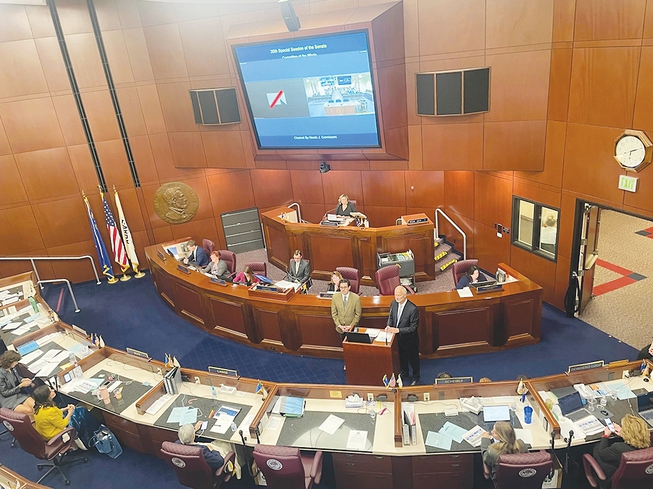
Gabe Stern / AP
Lawmakers sit at their desks June 7, 2023, in the Nevada Senate chambers in Carson City during a special legislative session to consider whether to provide $380 million for a proposed $1.5 billion stadium to facilitate the Oakland Athletics’ move to Las Vegas. Lawmakers approved the expenditure, but now the Nevada State Education Association has set up a committee, Schools Over Stadiums, that it says is the first step in “pursuing every possible path to stop the use of public funds to subsidize a billionaire’s stadium.”
Saturday, July 1, 2023 | 2 a.m.
Las Vegas Strip baseball stadium
Nevada educators are preparing to sue to block the implementation of the public financing bill that offers $380 million in subsidies for a stadium for the Oakland Athletics to relocate to Las Vegas, or rally the signatures needed for voters to decide whether the funding law should be nullified.
Here’s how the Nevada State Education Association, by way of its newly formed political action committee, Schools Over Stadiums, could make that happen:
• Litigation: Chris Daly, the Schools Over Stadiums vice president, said the most compelling argument is that the funding runs afoul of the state constitution. The stadium’s proposed Strip-
area site — where the Tropicana currently stands — will sit within a new special taxing district, directing tax revenues collected there to the stadium’s construction. But Daly argues that any change to tax revenue generation in that district constitutionally requires a two-thirds majority vote. The stadium bill passed with simple majorities.
• Referendum: Daly estimated that Schools Over Stadiums would need to collect about 102,000 valid petition signatures from registered Nevada voters, evenly split around Nevada’s four congressional districts, to put the matter on the 2024 general election ballot. A referendum “seeks to approve or disapprove an existing state or local law,” according to the Nevada Secretary of State’s Office.
The number of signatures required is based on how many people voted in the 2022 general election. Petitioners must obtain the number of valid signatures of registered voters equal to at least 10% of the number of voters who voted in the last preceding general election (in this case, 1,023,617). The group can begin collecting petition signatures in August.
• Initiative: A statutory initiative seeks to create a new law or amend an existing law. In this case, that would mean the latter.
As with a referendum, Schools Over Stadiums needs to collect about 102,000 valid petition signatures from around the state. The group can begin collecting signatures in January to get an initiative in front of the Legislature for its 2025 session. If lawmakers don’t pass the initiative that session, the matter automatically goes to the general election ballot in 2026.
Daly explained that with an initiative, proponents are writing a law. The Legislature would not be able to undo it without voter approval.
There would be an overlapping window between January and July of 2024 when Schools Over Stadiums could collect signatures for both a referendum and an initiative.
A lawsuit, referendum and initiative are not dependent on one another, so the stadium opponents could pursue these in some combination.
“My preference is all of the above,” an “and/or” strategy to cover contingencies,” Daly said.
NSEA is Nevada’s largest educators union, and it has been consistently vocal about how it perceives the state’s priorities at the expense of public schools.
On its committee registration form with the secretary of state, the group stated Schools Over Stadiums’ purpose is “to prioritize public education over corporate tax giveaways.”
When it announced Schools Over Stadiums on Thursday, the NSEA said the committee was the first step in “pursuing every possible path to stop the use of public funds to subsidize a billionaire’s stadium.” That billionaire is A’s owner John Fisher.
Gov. Joe Lombardo on June 15 signed a $380 million public financing package for the A’s stadium. The package includes $180 million in transferable tax credits and $120 million in bonds from Clark County as part of the public assistance toward the development of a $1.5 billion stadium. The stadium is tentatively scheduled to open in 2028, although Major League Baseball must approve the team’s relocation.
“This is an incredible opportunity to bring the A’s to Nevada, and this legislation reflects months of negotiations between the team, the state, the county and the league,” Lombardo said right after signing the bill. “Las Vegas’ position as a global sports destination is only growing, and Major League Baseball is another tremendous asset for the city.”
The Legislature convened for a special session just to consider the stadium funding bill, Senate Bill 1. The Assembly passed SB 1 on a 25-15 vote. The state Senate approved it 13-8.
The NSEA juxtaposes the state investment in a private sports facility with Nevada’s chronically low funding for public schools and stubborn educator staffing vacancies. The Education Law Center ranks Nevada 47th for per-pupil funding, while the National Education Association ranks Nevada 46th. And as of Friday, the Clark County School District alone had more than 1,300 teacher job openings posted.
“Nevada’s priorities are misguided, and public funds should not go to a California billionaire for a stadium,” said Dawn Etcheverry, a Washoe County music teacher and president of NSEA and Schools Over Stadiums, in a statement. “For years, Nevada educators have been issuing an SOS over the dire conditions in our schools. The goal of Schools Over Stadiums is to right this ship and keep the focus on Nevada’s true priorities — our kids, our parents and our educators.”
